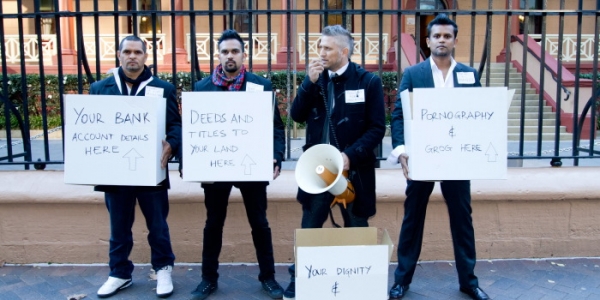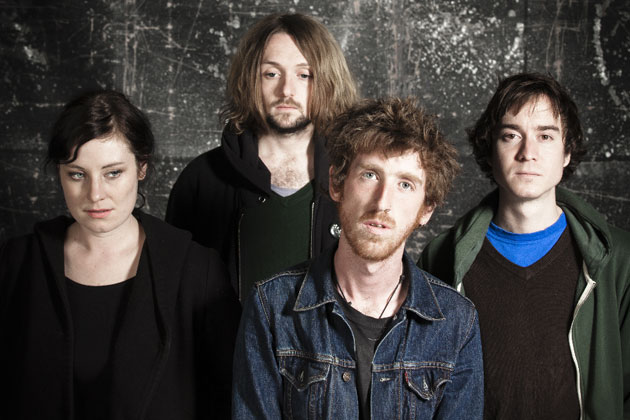“I guess I’ve always been into conscious music,” says Grant Saunders aka Sonic Nomad when reflecting on what first drew him to protest music. “I mean I grew up on Bob Marley and the first sort of hip hop track that turned me on was The Message. I was only a teenager back then and it sort of inspired me big time to start writing stuff that affects our people. I think hip hop, when it started, in essence, was really giving voice to the voiceless and empowering those who are constantly disempowered by the system.”
Being an Aboriginal Australian immediately gives Saunders credibility when it comes to speaking out about the injustices and divide that has continually surrounded his people. The release of Whitehouse’s debut album A Funky Intervention earlier this year was not only a chance to get their music out to the masses but also a way to spread their message. Bunkering down in the studio with ex-Thirsty Merc guitarist Sean Carey saw Saunders’ normally aggressive vocal delivery be toned down while still retaining the same impact. “It was just fun working with Sean and just a pleasure to work with someone who’s truly professional and just knows what he’s doing, “says Saunders. “He’s a musician himself so he just knows how to get the right sounds.” At Carey’s request, Whitehouse also redefined their sound, the result being an album full of funky bass lines, solid beats and hip hop flavours with Saunders’ spoken word vocal style up front. “The guys are so talented; like the musicians that are in the band they got it straight away,” he says of the band’s time in the studio. “Like we we’re able to just reinvent ourselves at the drop of a hat. We just turned, flipped the script and came up with this new sound that we’re really digging and audiences are digging it as well so it’s been good.”
There’s no doubting that it’s Saunders’ lyrics and vocals that are the focal point of the album with the frontman tackling a number of issues that throughout the history of this country have continued to plague the Indigenous populations. “I guess a lot of these tracks, yeah they’re politically charged. They’re really sort of [a] social conscious,” he muses. “We’re trying to get people to feel or think what it might be like to be Aboriginal in this country. So I’m giving a perspective, its mine but it’s something I think a lot of Aboriginal people share.”
Although Whitehouse clearly have some pretty strong views and opinions, according to Saunders the band is not looking to ram it down people’s throats. Instead, their music is designed to spark awareness and to get the listener to think about the issues with this method also being used with the album’s cover art. “The cover of the album and the name of the album The Funky Intervention, if you look at the cover; its protest art,” says Saunders. “We’re making a parody on the whole Northern Territory intervention and the good thing about satire, like good satire and parody is you get people to laugh at something that’s fairly serious and then later on think about what they’re laughing at.
“Its like that’s what were trying to do with our music,” he continues. “Because if we get too sanctimonious and get up there and spit diatribes, like political stuff at people and bash them around the head people are just going to tune out, people don’t want that anymore. So we’re trying different angles, get people dancing and laughing and then later thinking.”
Australia too has had a long tradition of protest songs yet Saunders believes that it has perhaps been in decline in recent times giving way to more accessible forms of music. Yet with a number of new bands, particularly sprouting up from the hip hop community, he believes that there is certainly enough room in the current Australian musical landscape for both types of music. “[Protest music] hasn’t been in this country, not since Midnight Oil, since we’ve really had some proper protest music and it’s always had a place,” he muses. “People have through various art forms, not just music, [such as] art to parody and to challenge social regimes, political regimes. Ever since people who started becoming democratic and political there was always artists that were outspoken and gave an alternative viewpoint and put it in a way that was digestible for audiences.”
BY JAMES NICOLI

